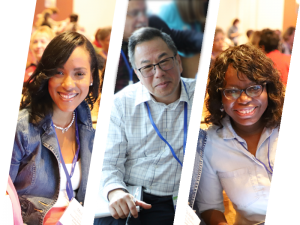Rising to the Occasion and Our Calling: 3 Takeaways From the 2020 Virtual Annual Conference
 Those who participated in this year’s virtual annual conference experienced powerful and inspiring messages from keynote speakers and higher ed leaders on timely topics, such as systemic racism in the higher ed workplace; how the COVID-19 pandemic has changed the higher ed landscape, provided growth opportunities and strengthened bonds and trust; and much more. Here are three of our key takeaways.
Those who participated in this year’s virtual annual conference experienced powerful and inspiring messages from keynote speakers and higher ed leaders on timely topics, such as systemic racism in the higher ed workplace; how the COVID-19 pandemic has changed the higher ed landscape, provided growth opportunities and strengthened bonds and trust; and much more. Here are three of our key takeaways.
Higher Education Institutions Can and Must Combat Systemic Workplace Racism
Dr. Shaun Harper, provost professor in the Rossier School of Education and the Marshall School of Business at the University of Southern California (USC) and founder and executive director of the USC Race and Equity Center, shared his insights from years of campus racial climate studies at institutions across the country. Every day in the higher ed workplace, Black employees experience inequitable opportunities for advancement, a sense of “onlyness” (what Black employees experience when they are the only person of color in a meeting, on a committee or in a department, while also being expected to be the spokesperson for Black employees and educator to non-Black employees), racial microaggressions, white fragility, and more.
Dr. Harper called on all higher ed institutions to take action, and to combat systemic workplace racism by denouncing white supremacy embedded in structures, culture, hiring and promotion practices, and by holding people accountable for acts of racism. He urged institutions to formally assess their workplace racial climate and develop an institutional strategy for implementing change. He also challenged them to create formal leadership programs that specifically invest in employees of color, to create and fund Black employee resource groups, and to hire more Black employees. We can and must sustain the momentum.
COVID-19 Has Irrevocably Changed the World of Work
For many institutions, COVID-19 has created not only challenges, but also opportunities no one could have foreseen in the early days of the pandemic. Susan Norton, vice president for HR at Augusta University, facilitated a panel discussion on that topic with Provost Paul Gore and Chief HR Officer Lynn Bynum of Bellarmine University and President Ruth Watkins and Chief HR Officer Jeff Herring of University of Utah.
This shared crisis has brought together administrators, faculty and staff in unique ways. It has sparked creative and innovative ideas for work and teaching, including a new class model created by Bellarmine to explore the implications of the pandemic from an interdisciplinary perspective. The pandemic has also inspired cross-departmental collaboration and problem-solving, and has opened the door to streamlining HR processes with technology in ways that might have otherwise taken months to implement.
The University of Utah has been able to play a key role in state testing for COVID-19, spotlighting the value and importance of research universities. And for HR, the quick shift to remote work has opened doors to re-evaluating how work gets done now and in the future. All of the panelists emphasized the opportunities for technology, collaboration and communication to foster relationships that help move our institutions forward — the perfect segue to our final keynote presentation.
The Key to Our Own Success Is Helping Others to Succeed
Wes Moore, CEO of Robin Hood, one of the largest anti-poverty forces in the nation, and author of the best-selling book, The Other Wes Moore, wrapped up the conference with a message of hope as we continue to pivot and support the mission of our institutions during these unpredictable times.
He pointed out this fundamental truth: “If you want to make sure that your future is full of opportunities and pathways, you’d better make sure that everybody in our society feels like their future is full of opportunities and pathways. The best way to protect our future is to make sure that we’re protecting the future of others.”
Moore reminded us that as higher education leaders, we have the opportunity to inspire others, to get creative, to push and to dream. We must cheer each other on in our work, because when one of us succeeds, all of us succeed. His words echoed the message CUPA-HR has shared with members during this season of transition and growth — higher ed HR is resilient, and we are in this together!


